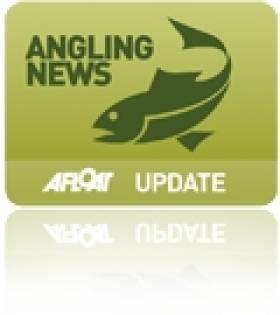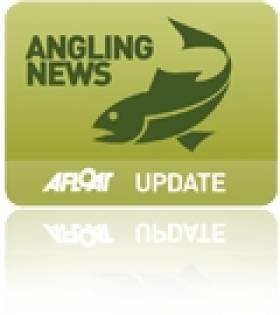Displaying items by tag: Ballina
Shannon Navigation: Outfall Works Downstream of Killaloe and Ballina
Waterways Ireland advises masters of vessels on and users of the Shannon Navigation that Uisce Éireann will be installing an outfall downstream of Killaloe and Ballina from next Monday 21 August to the end of September.
A work barge will be launched from the carpark adjacent to the Waterways Ireland building in Killaloe and will operate south of the bridge adjacent to the Ballina wastewater treatment plant for the duration of the works.
The outfall will extend from the Ballina plant into the river for a distance of 90 metres.
Two temporary special markers will be installed to mark the limits of the in-river works area downstream of Killaloe and Ballina. A permanent navigation marker will be installed when the works are completed.
Masters of vessels should proceed with additional caution in the vicinity of the works, adds the cross-border body for Ireland’s inland waterways.
Mayo county councillors have called for a formal letter demanding that Dublin Port Company reverse its decision to end the regular rail freight service to Ballina, as The Western People reports.
At a meeting of Ballina Municipal District this morning (Wednesday 16 June), local councillors expressed their dismay at the sudden cessation of the seven-times weekly service from Dublin last Thursday.
One councillor branded the move as a “thump in the face for north Mayo”, suggesting that protests akin to those highlighting the mica crisis in the North West could be in the offing, while another said port management should be pressed to find a solution to the congestion issues cited in the decision.
The Western People has much more on the story HERE.
#Angling - At a sitting of Ballina Circuit Court on Thursday 19 February, Judge Petria McDonnell affirmed convictions against Gerry Bourke of Pollathomas, Ballina, Co Mayo.
In September 2014, Bourke had been convicted at Belmullet District Court for offences relating to an illegal netting operation on the Owenmore River near Bangor Erris in August 2013, and had appealed his conviction to the Circuit Court.
It should be noted that the commercial salmon draft net estuarine fishery on the Owenmore River was closed in 2014 because of declining salmon runs, and angling was restricted to strictly catch and release. This restriction remains unchanged for 2015.
Having heard the case in full, Judge Petria McDonnell affirmed the fines imposed in the District Court. She directed that the sum of €400 be paid in respect of each count, amounting to a total of €800, and also imposed total costs of €1,500, giving Bourke 18 months to pay.
In her concluding remarks, Judge McDonnell stated that fishing offences may be regarded as trivial by some, but pointed out that such offences were, in effect, theft and had to be taken seriously.
She commented further that Bourke’s approach to the case had cost a significant sum of money.
Inland Fisheries Ireland (IFI) has a confidential hotline number to enable members of the general public to report incidents of illegal fishing, as well as water pollution and invasive species, at 1890 34 74 24 or 1890 FISH 24.
Three Convicted for Obstruction and Assault on Fishery Officers in Mayo
#fishing – At a sitting of Ballina Circuit Court on Friday, 20th February, Judge Petria McDonnell convicted three people of obstruction and assault on Fishery Officers, arising from an incident which occurred in August 2012.
Inland Fisheries Ireland was successful in an appeal brought before the Circuit Court, which reversed the decision reached in the District Court, Ballina, Co Mayo, on 24th February 2014, when all charges brought against the defendants had been dismissed on technical grounds.
Before the court were: Mrs Margaret Hopkins, charged with obstruction; Mr Declan Hopkins Jr., charged with obstruction and assault; and Mr John Ferguson, also charged with obstruction and assault. All the defendants have addresses in Ballina, Co Mayo.
The charges resulted from an incident which occurred on the 28th August 2012, when Fishery Officers seized an illegal salmon gill net from a public laneway to the rear of St Muredach's Terrace, Ballina. Evidence was given that upon attempting to leave the laneway, the officers were obstructed from doing so by Mrs Hopkins, who stood in front of the vehicle, banged her fists on the car, and demanded that the net be returned as it belonged to her. At that point the officers requested Garda assistance.
The court heard that Mrs Hopkins was quickly joined by Mr John Ferguson, who started shouting abusive language and behaving aggressively, and attempted to strike one of the officers with his fist. Evidence was given that Mr Declan Hopkins Jr. then arrived, and he also behaved in an aggressive manner, pushing one officer and attempting to punch another officer with his fist. It was also stated in court that Mr Ferguson, who had briefly left the scene of the incident, returned wielding a hammer, with which he threatened the officers.
Judge McDonnell heard evidence that Mr Ferguson swung the hammer at one officer, narrowly missing his head, and continued to wave the hammer around in a threatening manner. The court also heard that after a brief period the Gardaí arrived and directed the defendants to step aside and let the officers leave. The hammer and net were removed by the officers.
In her summing up, Circuit Court Judge McDonnell was in no doubt that the fishery officers were working within their powers and authority vested in them by the Fisheries Acts in seizing the net from the laneway. She was also satisfied that charges of obstruction and assault brought against the defendants had been proven.
The following penalties were imposed: John Ferguson was sentenced to 5 months in prison, suspended for 18 months on the charge of assault (charge of obstruction taken in to account) plus €1,000 expenses. He was also bound to the peace for 18 months, and had to enter a bond of €150. During that time he is not to approach any Fishery Officer in Mayo or Galway. He also has to engage with the probation service.
Declan Hopkins Jr. was fined €750 on the charge of assault (charge of obstruction taken into account) plus €1,500 expenses. Margaret Hopkins was fined €600 on the charge of obstruction plus €1,200 expenses.
Inland Fisheries Ireland (IFI) has a confidential hotline number to enable members of the general public to report incidents - 1890 34 74 24 or 1890 FISH 24. This phone line is designed to encourage the reporting of incidents of illegal fishing, water pollution and invasive species.
Shannon Cruiser Crash
A man at the upper controls of a cruiser on the inland waterways jumped to safety just before his vessel hit a bridge in Co Tipperary on Friday last.
The man was believed to be attempting to moor the vessel close to the bridge at Ballina on the Shannon when he lost control. The boat hit one of the bridge arches causing extensive damage to the boat’s upper-level console. It is believed that only for the water level at the time and his quick actions he could have been seriously injured.
There were six people on board the vessel all of whom were in the lower deck and uninjured.
The incident was witnessed by a member of the Killaloe unit of the Irish Coast Guard, who raised the alarm. Rescuers went to the scene and discovered that the cruiser had been extensively damaged.
Port of Ballina
Port of Ballina
Coordinates: 54°07′00″N 9°10′00″W / 54.1167°N 9.1667°W / 54.1167; -9.1667
Ballina (Irish: Béal an Átha or Béal Átha an Fheadha, lit. mouth of the ford) is a large town in north Co Mayo in Ireland. It lies at the mouth of the River Moy near Killala Bay, in the Moy valley and Parish of Kilmoremoy, with the Ox Mountain range to the east and the Nephin Beg mountains to the west. The town occupies two Baronies; Tirawley on the west bank of the Moy River, and Tireragh on the east bank.
The recorded population of Ballina's urban area is 10,409. Census 2006 figures released by the Central Statistics Office in September 2007 showed that Ballina had the highest rate of unemployment amongst large towns in the Republic of Ireland. Some 15.8% of Ballina's population was out of work when the 2006 census was taken. Unlike neighbouring towns such as Castlebar and Sligo, it is claimed that Ballina suffered from a lack of government investment for many years because it was not effectively represented in Dail Eireann.
According to Encyclopaedia Britannica the first signs of settlement on the site of the town dates from around 1375 when an Augustinian friary was founded. Belleek, now part of the town, pre-dates the town’s formation, and can be dated back to the late 15th century, or early 16th century. However, what is now known as Belleek Castle was built in 1831. Ballina was officially established as a town in 1723 by O'Hara, Lord Tyrawley.
Belleek Estate
The Belleek estate once occupied lands from the Moy River to the modern-day Killala Road. This included part of the ‘Old French Road’ which General Humbert marched on from Killala, and beside part of which in the Killala Road-Belleek area was Belleek’s reservoir – presumably destroyed in the construction of Coca-Cola’s ‘Ballina Beverages’ factory; the ‘Old French Road’ is now closed off at that point, with what amounts to diversion road signs claiming Humbert marched where he did not.
Old Borders
Ballina is located on the west side of the County Mayo - County Sligo border. Part of what is now the town was once (prior to the Local Government Act, 1898) part of County Sligo, with the border for the most part once being the River Moy, east of which was in Sligo, including Ardnare], and Crockets Town (the Quay).
Port of Ballina, River Moy Harbour Commission, The Quay, Ballina, Co. Mayo. Tel: 096 21208.

























































